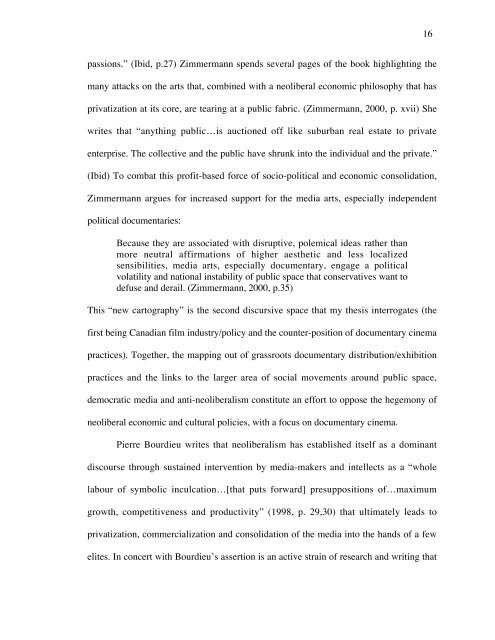The Spaces Between Grassroots Documentary ... - Ezra Winton
The Spaces Between Grassroots Documentary ... - Ezra Winton
The Spaces Between Grassroots Documentary ... - Ezra Winton
You also want an ePaper? Increase the reach of your titles
YUMPU automatically turns print PDFs into web optimized ePapers that Google loves.
passions.” (Ibid, p.27) Zimmermann spends several pages of the book highlighting the<br />
many attacks on the arts that, combined with a neoliberal economic philosophy that has<br />
privatization at its core, are tearing at a public fabric. (Zimmermann, 2000, p. xvii) She<br />
writes that “anything public…is auctioned off like suburban real estate to private<br />
enterprise. <strong>The</strong> collective and the public have shrunk into the individual and the private.”<br />
(Ibid) To combat this profit-based force of socio-political and economic consolidation,<br />
Zimmermann argues for increased support for the media arts, especially independent<br />
political documentaries:<br />
Because they are associated with disruptive, polemical ideas rather than<br />
more neutral affirmations of higher aesthetic and less localized<br />
sensibilities, media arts, especially documentary, engage a political<br />
volatility and national instability of public space that conservatives want to<br />
defuse and derail. (Zimmermann, 2000, p.35)<br />
This “new cartography” is the second discursive space that my thesis interrogates (the<br />
first being Canadian film industry/policy and the counter-position of documentary cinema<br />
practices). Together, the mapping out of grassroots documentary distribution/exhibition<br />
practices and the links to the larger area of social movements around public space,<br />
democratic media and anti-neoliberalism constitute an effort to oppose the hegemony of<br />
neoliberal economic and cultural policies, with a focus on documentary cinema.<br />
Pierre Bourdieu writes that neoliberalism has established itself as a dominant<br />
discourse through sustained intervention by media-makers and intellects as a “whole<br />
labour of symbolic inculcation…[that puts forward] presuppositions of…maximum<br />
growth, competitiveness and productivity” (1998, p. 29,30) that ultimately leads to<br />
privatization, commercialization and consolidation of the media into the hands of a few<br />
elites. In concert with Bourdieu’s assertion is an active strain of research and writing that<br />
16


